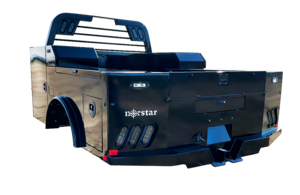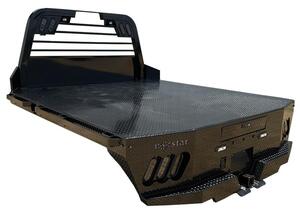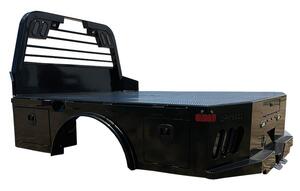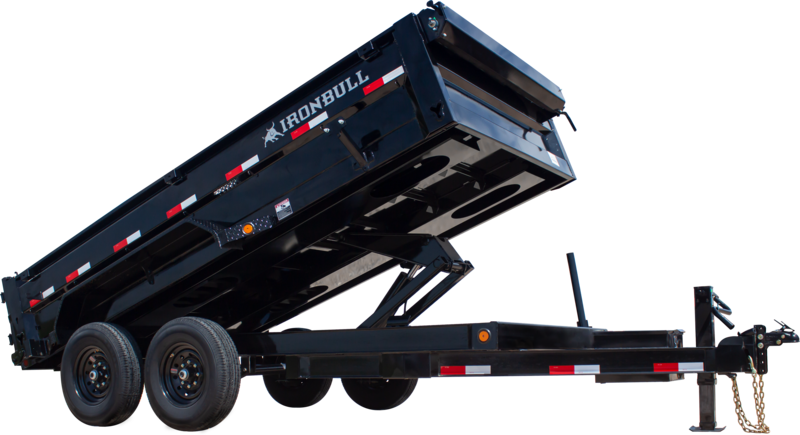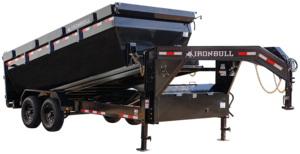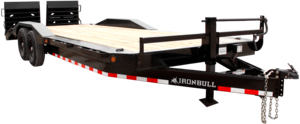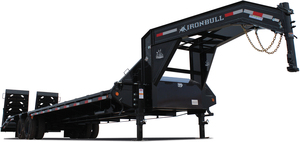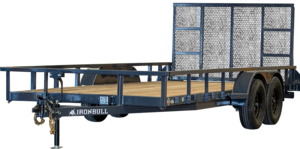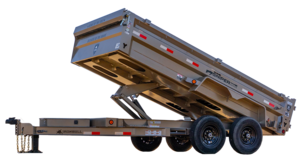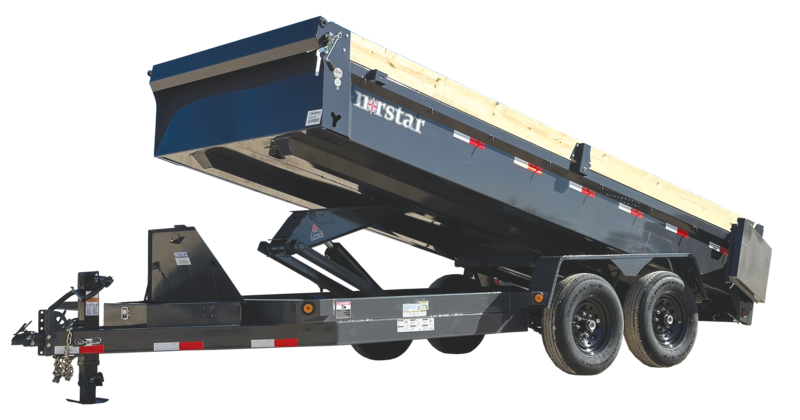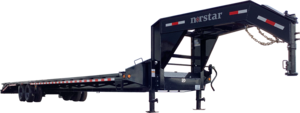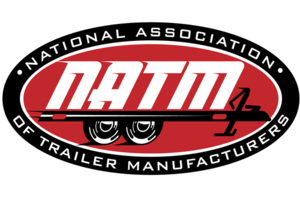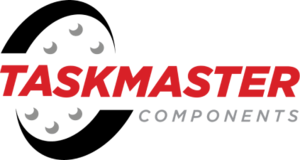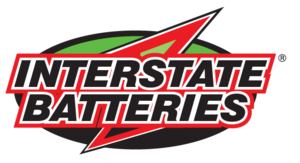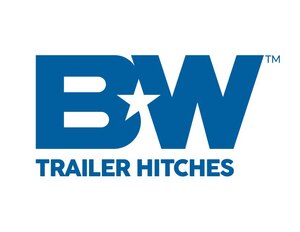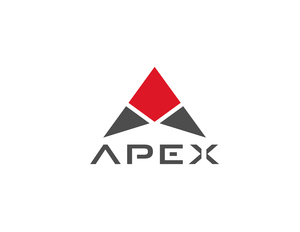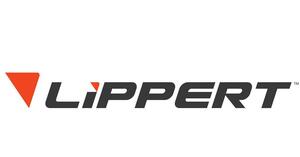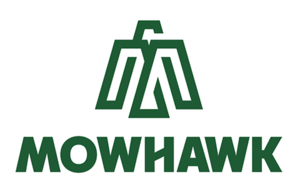Choosing the Perfect Equipment Trailer
Equipment trailers are a fundamental tool in industries like construction and agriculture, enabling the transportation of heavy machinery and equipment.
In this guide, we'll delve into the world of equipment trailers, providing essential insights on types, costs, safety considerations, and maintenance. Whether you're a seasoned professional or new to heavy-duty hauling, understanding equipment trailers is key to optimizing your transportation capabilities. Let's explore this critical aspect of various industries in-depth.
What is an Equipment Trailer?

An equipment trailer is a specialized type of trailer designed to transport heavy equipment and machinery. These trailers are built to handle significant loads and are indispensable for industries like construction, agriculture, and transportation.
Types and Varieties of Equipment Trailers
Equipment trailers come in various types, each tailored to specific needs.
Here are the primary varieties:
1. Flatbed Trailers
Flatbed trailers are versatile and open, making them ideal for transporting oversized or irregularly shaped equipment. They provide easy loading and unloading options and are often used in the construction and agricultural sectors.
2. Enclosed Trailers
Enclosed trailers offer protection from the elements and added security for your equipment. These are commonly used in industries where sensitive or valuable cargo needs safeguarding, such as the automotive industry.
3. Utility Trailers
Utility trailers are multi-purpose and can carry a range of equipment. They are known for their flexibility and are popular among small businesses and individual operators.
What Are the Key Features and Components of Equipment Trailers?
Understanding the components of an equipment trailer is crucial when making a choice.
Here's what you need to know:
Trailer Frame and Construction

The frame and construction materials of a trailer determine its durability and weight capacity. Steel and aluminum are commonly used materials, each with its advantages.
Axles, Wheels, and Suspension
Axles, wheels, and suspension systems affect the trailer's stability and load-bearing capacity. Tandem axles are a popular choice for heavier loads.
Trailer Hitches and Couplings
Choosing the right hitch and coupling system ensures that your trailer securely connects to your towing vehicle. Different hitches are suitable for various applications.
How Much Does An Equipment Trailer Cost?
The cost of an equipment trailer can vary significantly depending on several factors, including its size, type, and features. Understanding these cost factors is crucial when you're in the market for one. Let's break down the costs of different sizes of equipment trailers.
18 ft Equipment Trailer

When considering an 18 ft equipment trailer, it's essential to recognize that the average cost can fluctuate based on various factors. These factors include the materials used in its construction, the features it offers, and even regional market trends.
Typically, you can expect to pay anywhere from $3,000 to $6,000 for an 18 ft equipment trailer. Keep in mind that prices may vary, so it's advisable to obtain quotes from multiple sources to find the best deal.
16 ft Equipment Trailer
A 16 ft equipment trailer is a popular choice for many hauling needs. The price range for a 16 ft trailer can vary depending on factors such as the trailer's construction materials and additional features. On average, you can anticipate a price range of $2,500 to $5,000 for a 16 ft equipment trailer. However, prices can differ based on your location and specific trailer requirements.
20 ft Equipment Trailer
For those in need of more space, a 20 ft equipment trailer may be the right choice. These trailers offer increased capacity but also come with a price tag that varies based on factors such as materials, features, and geographical location. Typically, you can budget for a price range of $4,000 to $8,000 for a 20 ft equipment trailer. As always, obtaining quotes and considering your specific needs will help you make an informed decision.
How to Choose the Right Equipment Trailer for Your Needs?
Choosing the perfect equipment trailer is a decision that should be made with careful consideration of various factors.
To ensure you make the right choice, you need to evaluate the following:
Nature of Your Cargo
The type, size, and weight of the cargo you'll be transporting are crucial factors. Different trailers are designed for specific types of equipment or goods, so matching your trailer to your cargo is essential for safe and efficient transportation.
Towing Capacity
Your towing vehicle's capacity must align with the trailer's weight and payload. Exceeding the towing capacity can lead to safety hazards, so always ensure compatibility.
Trailer Features
Consider additional features such as ramps, tie-down points, and storage options. These features can greatly enhance the usability and convenience of your equipment trailer.
Terrain and Conditions
Think about the terrain and weather conditions you'll encounter during your hauling tasks. Some trailers are better suited for off-road use or adverse weather conditions than others.
Budget
Determine your budget for the trailer, including any necessary accessories and maintenance costs. Balance your budget with your specific requirements.
What Are the Safety Considerations and Regulations for Equipment Trailers?
Safety is of utmost importance when using equipment trailers.
Here are some essential safety measures and regulations to keep in mind:
Proper Hitching
Ensure that your trailer is securely hitched to your towing vehicle using the appropriate hitch and coupling system. Follow manufacturer guidelines for hitching and double-check for a secure connection.
Weight Distribution
Properly distribute the weight of your cargo on the trailer to maintain stability. Overloading the front or rear can lead to swaying or loss of control.
Braking Systems
Verify that your trailer has functional brakes and that they are properly adjusted. Many jurisdictions have regulations regarding trailer brakes, so be aware of local laws.
Lights and Signals
Ensure all trailer lights and signals are operational. This includes brake lights, turn signals, and reflectors, which are critical for road safety.
Load Securement
Use appropriate tie-downs and straps to secure your cargo to the trailer. Loose or unsecured loads can be hazardous to you and other road users.
Speed and Driving
Maintain a safe and legal speed when towing a trailer. Be aware of the increased stopping distance required and practice safe driving techniques, especially when navigating turns and hills.
Regulations
Familiarize yourself with local, state, and federal regulations regarding equipment trailers. These may include weight limits, licensing requirements, and safety inspections.
How to Properly Load and Secure Equipment on a Trailer?
Properly loading and securing your equipment on a trailer is vital for safe transportation.
Here are expert tips on this critical aspect of trailer operation:
- Balance the Load: Distribute the weight evenly across the trailer to prevent overloading one side, which can lead to instability.
- Use Quality Tie-Downs: Invest in high-quality tie-down straps and chains to secure your equipment. Ensure they are in good condition and properly rated for the weight of your cargo.
- Secure All Loose Items: Remove or secure any loose items on the equipment or trailer to prevent them from falling during transport.
- Check Tension: Make sure tie-downs are tight and secure. Regularly inspect them during your journey to ensure they remain tight.
- Inspect Trailer Flooring: Ensure the trailer's flooring is in good condition and free from any damage that could compromise load stability.
- Cover Vulnerable Parts: Protect fragile or sensitive equipment with appropriate padding or covers to prevent damage during transit.
- Flag Overhangs: If your cargo extends beyond the trailer's width or length, use warning flags or lights to make other drivers aware of the overhang.
What Are the Maintenance and Care Requirements for Equipment Trailers?
Equipment trailers, like any other valuable tool, require regular maintenance to ensure they remain in top condition.
Let's delve into the key aspects of maintaining and caring for your equipment trailer.
Routine Inspection and Lubrication
Routine inspection and proper lubrication are essential for the longevity of your equipment trailer:
- Visual Inspection: Regularly inspect the trailer's frame, axles, wheels, tires, and braking system for signs of wear, damage, or corrosion. Pay attention to welds, bolts, and nuts, and tighten any loose components.
- Lubrication: Keep all moving parts well-lubricated, including axles, bearings, and hitch mechanisms. Proper lubrication reduces friction, prevents premature wear, and ensures smooth operation.
- Tire Maintenance: Check tire pressure regularly and ensure they are properly inflated according to manufacturer recommendations. Inspect tires for signs of wear, such as uneven tread or damage, and replace them as needed.
- Brake Inspection: If your trailer has brakes, inspect them for proper function and adjust them as necessary. Brake pads and drums may require replacement over time.
- Electrical and Lighting: Test all trailer lights and electrical connections to ensure they function correctly. Repair or replace any damaged wiring or bulbs promptly.
- Safety Chains and Couplings: Verify that safety chains and couplings are in good condition and properly connected. These components are crucial for preventing accidents in the event of a hitch failure.
- Coupler Lubrication: Apply grease to the coupler's moving parts to ensure it operates smoothly during hitching and unhitching.
Addressing Wear and Tear
Recognizing common signs of wear and tear on trailers is essential for timely maintenance:
- Rust and Corrosion: Address rust and corrosion promptly by sanding affected areas and applying rust-resistant paint or coatings.
- Tire Wear: Uneven tire wear can indicate alignment issues or improper inflation. Address these issues to extend tire life and ensure safe towing.
- Brake Issues: If you notice decreased braking performance or unusual noises, have the trailer's braking system inspected by a professional.
- Bearing Maintenance: Grease bearings regularly and replace them when they show signs of wear, such as overheating or excessive play.
- Welding and Structural Integrity: Inspect welds and the overall structural integrity of the trailer. Repair any cracks or weak points to prevent further damage.
Trailer Storage and Longevity
Proper trailer storage and care contribute significantly to its longevity:
- Covered Storage: Whenever possible, store your trailer in a covered area to protect it from the elements, such as rain, sun, and snow.
- Cleaning: Regularly clean your trailer to remove dirt, debris, and corrosive substances. Pay special attention to the underside, where road salt and grime can accumulate.
- Use Wheel Chocks: When the trailer is not in use, use wheel chocks to prevent it from rolling or moving.
- Raise the Trailer: If storing the trailer for an extended period, consider raising it off the ground using trailer jacks to relieve pressure on the tires and axles.
- Annual Maintenance: Schedule an annual professional inspection and maintenance service to catch and address any hidden issues.
What Are the Advantages and Considerations of Owning or Renting an Equipment Trailer?
Determining whether to purchase or rent an equipment trailer is a decision influenced by your unique requirements and situation. Both options have their advantages and considerations that deserve exploration.
Advantages of Owning:
- Long-term cost-effectiveness.
- Greater control and customization.
- Immediate access for transportation.
Considerations of Owning:
- Significant upfront costs.
- Requires storage space.
- Responsibility for maintenance and repairs.
Advantages of Renting:
- Flexibility for short-term or occasional needs.
- Variety of trailer options.
- No maintenance or repair responsibilities.
Considerations of Renting:
- Rental costs can accumulate.
- Availability may vary.
- Limited customization options.
Ultimately, the choice between owning and renting an equipment trailer hinges on your individual needs, budget, and the frequency of use. Carefully weighing these advantages and considerations will help you make an informed decision.
What Is the Future of Equipment Trailers in Industry and Transportation?
Equipment trailers are poised to become even more versatile and technologically advanced. The integration of smart technologies, such as GPS tracking and telematics, will enhance trailer monitoring and security. These innovations not only improve cargo tracking but also contribute to overall fleet efficiency. Additionally, advancements in materials and design are making trailers lighter, more fuel-efficient, and environmentally friendly.
Sustainability is also becoming a central theme in the equipment trailer industry. Manufacturers are increasingly adopting eco-friendly materials and production processes to reduce their carbon footprint. This shift aligns with broader industry trends focused on environmental responsibility.
The automation of certain trailer functions is on the horizon. Automated loading and unloading systems, for example, can significantly reduce labor costs and improve efficiency. These innovations will shape the future of equipment trailers, making them more efficient, environmentally friendly, and user-friendly.
Your Journey Begins with Norstar Company
At Norstar Company, we understand the critical role equipment trailers play in various industries. Whether you're in construction, agriculture, or any field requiring heavy cargo transport, our range of equipment trailers is designed to meet your diverse needs with reliability and top-notch performance.
Explore our comprehensive lineup of equipment trailers at Norstar Company. Use our Dealer Locator to find a dealership near you by visiting our Find a Dealer page, and feel free to reach out to us for inquiries or to request a personalized quote through our Contact Page. Join us as we shape the future of equipment transportation, and experience firsthand the Norstar difference.
Remember, when it comes to efficient equipment transportation, your journey starts with Norstar Company, where quality, reliability, and innovation converge to redefine industry standards. Find a dealer today and discover how Norstar can meet your equipment trailer needs.




